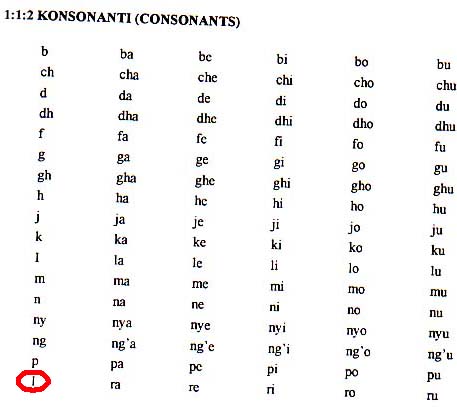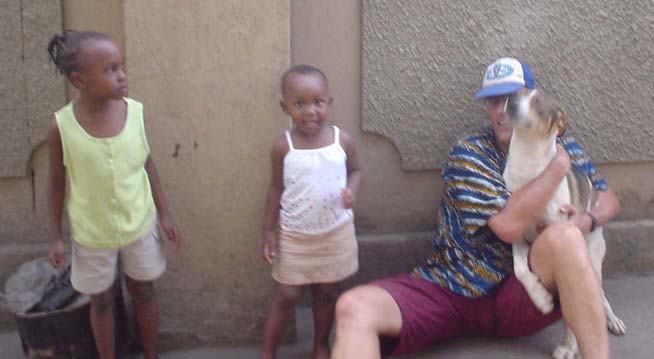
| East Africa Home |
| Kiswahili Home |
Crtd 04-11-27 Lastedit 14-11-18
Kiswahili, no plobrem
Kiswahili today and in history
Kiswahili is not
an original native African language. It originated as a kind of "Esperanto", a
simplified intertribal Bantu language, used for trade and diplomacy between
Bantu tribes among each other and with the Arabs at the coast of Tanzania and
Kenya. The most profitable selling item of the "Kiswahili"-people slaves. Their
business consisted of raiding the East African inland, chaining entire village
populations and selling all who survived the journey on foot to the coast.
Nobody in Africa seems to remember that it was the ethnic Africans who made
(captured) the slaves. Foreigners only bought them and consequently those
foreigners, now sometimes held liable by Africans to pay damages for
slavery, actually should receive them, because first, ethnic Africans
sold them slaves, then those ethnic Africans started to teach the buyers that
slavery was immoral, after which the slaves have been freed. But the money has
never been returned.
As a result of the Arab presence at the East African coast, Kiswahili has had a heavy influx of Arab words. Nowadays, one
would expect English influences. They are there (see below), but much more
limited than the Arab influence. Though "bar" is baa and "server" is
seva, website is kuraza pembuzi tovuti, "processor" is
kichakato, and
"hard drive" is kisukumo msingi. Kiswahili speakers are not even shy to have their own word for
"iceberg": kisiwa barafu,
though nowhere there ground temperatures below 17o
C can be felt.
Kiswahili is spoken in Tanzania, Kenya, Uganda, and its bordering regions,
especially East Congo. That is about the range of the African slave (and ivory)
trade.
The author on the Page One of his Kiswahili book (left Supa, right Haipa)
Grammar: astonishing to westerners
Though having a lot of foreign words, Kiswahili
has a Bantu grammar. This grammar is amazing to any speaker of an Indo Germanic
or Slavic language, whose first question about a word is: "is it male or female
(or neutre)?". French does not even have neutral words (only le and
la). German and Dutch allow for neutral (dass, het respectively), but
sex remains the foundation of grammatical distinctions. Even in English sex is
deep down, for instance where we have to decide how to say: "the committee has
not yet advised because he/she/it needs more information".
Bantu (Watu in Kiswahili simply means "people") take no grammatical interest in
sex. Of course, you have men (wanamume) and women (wanamke), but
there is no difference in their grammatical treatment. Kiswahili speakers have
other basic grammatical interests: you can talk about
people (plural for people everything is is wa: watu wetu wale wakubwa wamekuja - "those big people of ours have come")
other creatures that move around seemingly on their own initiative (animals, insects, fishes)
plants ("orange tree" is mchungwa, pl. michungwa)
edible parts of plants ("orange" is chungwa, "oranges" is machungwa)
dead things and tools we use in life bulk matter (earth, maize porridge) and abstract concepts (badness, old age)
words referring to time and place, that is where and when something is (or was, will be) to be found
It has advantages: when you hear for instance, the little boys of the neighbors say ni kidogo, "it is small", you can be sure it is not about each others penises because none of the sixteen words for penis are in the KI/VI - class.
This division in 7 classes is good enough to learn Kiswahili, though there are a lot of exceptions and even hybrid classes.
For verbs, you have a number of postfixes:
funga (shut), fungwa (be shut), fungika (become shut),
fungia (shut for), fungisha (cause to shut), and so on.
Pronunciation.
Kiswahili is easy to pronounce for westerners, especially when
you speak Italian. The syllable pattern is (single) consonant-vowel-(single)
consonant-vowel. The word ending is always a vowel, the stress is always on the
vowel before the last
one. Hence my name "Bert" is difficult: a
double consonant ending. The easiest and most common Kiswahili solution is
to say Btti. Kiswahili speakers who go for pleasing me with a final consonant
torture their tongues in order to end up with Brrelt. If any Dutchman
called Henk
does not want to be called Heki, this requires his daily attention. Kiswahili girls
called Jane are always called Jani and used to that. Peter will be
Pta. Some English words used by Kiswahili speakers: bar ba
(two separate a's with the stress on the first one). Shirt shti. Spare
spa. Bus: bsi. This prohibition of stress on the last vowel is
an absolute dogma in Kiswahili. Even when that last vowel has the stress of the
speakers intention, he will pronounce it unstressed. For instance
je (how) in alifanyeje (how did he do it) leaves the honour
of stress to ye which has little meaning apart from announcing that an
item in the ("after ye")-class of endings is going to follow.
The consonant-vowel-consonant-vowel preference in Kiswahili does not only
imply that often vowels are added. Sometimes they are skipped for
the same reason. For instance, to Kiswahili speakers, m is a vowel in many
cases, so they do not need an additional vowel o as the Portuguese in
"Mozambique": Msumbiji.
A more confusing difficulty, however, is the distinction between "l" and "r". When Kiswahili people speak English, I often hear "praying" when they want to say ""playing", and "playing" when they want to say "praying". The amazing thing is that they have no plobrem understanding the westerner's English pronunciation of "l" and "r". But I experienced absurd conversations like these:
Jeremia: at the next junction, we go light .
I: What is right in Kiswahili, Jeremia?
Jeremia: Kuria
I: And left?
Jeremia: Kushoto.
I: OK, so I can easily remember it: kuria has the "r" of "right"...
Jeremia: Yes, the r of light.
The dictionary turns out to give for "right": kulia with the l of "left".
Different Bantu languages generate "r" resp. "l" impressions in western ears at
different praces. There is no genelar lure.
Even Kiswahili text books find it hard to maintain "l" and "r" on there own praces
in the arfabet.

Vocabulary
Tu is not "you", as in Roman languages, but
"we"
M is not
"me" but
"you"(plural), and also "him", and thirdly, it can denote present
perfect, culminating in expressions like (Mmempa yeye You have given
him − M-me-m-pa
You-have-him-give)
Nane looks like
"nine" in many indo
European languages but it is
"eight"
Sita is
"six", and
should not be confused with Tisa
Tisa looks like
"thousand" but it is
"nine"
Mbili looks like
"mille" or
"million" thus
could thought to be
"thousand" or
"million", but it is
"two".
Elfu is not
"eleven" but
"thousand".
Si,
"yes" in Roman languages, means
"is not", negation
Ni, negation in all Indo-Germanic languages, is
"yes", affirming, positive.
Dada does not mean
"father" but
"sister"
Amekaa mbele fortunately does not mean
"American car", it means:
"the one sitting in front"
Hawana unfortunately has nothing to to with my cherished Cuban cigars,
that are very hard to get here. Hawana Havana means:
"they have no Havana's".
Kiswahili has arisen out of the necessity for
Bantu tribes to communicate in the East African trade boosted by the Arabs. It contains a host of Arab words. Arabs had a sophisticated
money economy (check is
an Arab invention and an Arab word!). It is all the more surprising that in Kiswahili, "bank"
is benk,
"change" is chenji. For "money" itself there are three words,
fedha
(Arab), hela (Hindi, Indians are the backbone of the East African
economy) and pesa, the origin of which, according to the authoritative
Johnson dictionary, is the Hindi "![]() ". That makes us end up without any traditional Bantu word for money.
". That makes us end up without any traditional Bantu word for money.
Quite thoughtfully Tumo baa ("We are in the bar"), has been chosen such as to be understandable even if spoken after quite some beers through a bad phone line. Why Kiswahili waited for the English to provide a word for "blue", (buluu), is an intriguing question. Kiswahili people tend not to give names to colors, but to say "the colour of...." (leaf, dry leaf, coffee, ash, turmeric)
The Germans and Dutch will be pleased to note that a "small mountain" (mlima) is kilima, a "small child" (mtoto) is kitoto etc. (so the German and Dutch klein, and not the English "small" or French petit). Mengi is many (Dutch: menige), ingine can mean "few" (German einige, Dutch: enige). "To enter" is ingia, in Dutch: ingaan. "Egg" is yai (Dutch ei, pronounces ai in German, including some Dutch dialects). All purely accidental, or would it have a background in instinctive primitive sound language developed in the time our ancestors were still laying eggs? "Ai!!!" Ultimate satisfaction for Germans: "School" is Schule in Kiswahili, but this really is a German loan-word.
To my utter astonishment Kiswahili has a word for a unit of seven days, hence "week". Why seven? How on earth would non Mesopotamic peoples have such a 7 days unit? It it is not based on any astronomical cycle whatsoever hence completely arbitrary. Answer: from de Muslims: "day 1" is Saturday, "day 7" is Friday. This leaves us in limbo concerning the true traditional Bantu handling of days, months and years.
Dictionary problems
Words, both nouns and verbs, get prefixes. The stem ti
means chair, but one always hears or sees it as kiti (sg.) or viti
(pl.). Pend is "want", but you always see or hear it like ninapenda, "I
want", sipendi, "I do not want" (i is a postfix and there are many types).
Hence one should know the word stem to find a word in an alphabetical
dictionary, typically something you do not know if you need to search for its
meaning.
I do not know for sure, but I have little doubt that the first Kiswahili writing
was in Arab letters. East Africa was at the fringe of Arab culture for at least
nine centuries before it was "discovered" (as the retarded Christians call
the event of their own first arrival after everyone else). No doubt reading
Kiswahili in Arab letters is much more appropriate, not only since you read in the opposite
direction (somebody told me I make a mistake here, but his argument was to
complicated for me).
Meanwhile I found (Encyclopaedia Britannica): The oldest preserved Kiswahili literature, which dates from the early 18th century, is written in the Arabic script.
Being forced on the barbaric Western alphabetization of Kiswahili, I took some Kiswahili dictionaries from the internet and merged them in a database. So, I now can type kiti, or ninapenda to select some 20 entries in which that grammatical form of the word is used, or type pend, to see if the selected records tell me whether or not it is a verb-stem.
My Standard Kiswahili - English Dictionary (founded on Madan's Kiswahili - English Dictionary) by the Late Frederick Johnson, with a foreword of the Bishop Thomas of Zanzibar, 1939, contains over 25 000 entries. Overviewing my downloaded internet digital dictionaries and making a reasonable correction for (Kiswahili) doubles, I estimate I have over 50 000 Kiswahili words in my computer, curiously enough, the Late Frederick Johnson has not (yet) been fully absorbed there (no scanner and text recognition software? Can I earn a little money from my African hut here in Mwanza?). It must be said that Kiswahili speakers, if they would overcome their abhorrence of counting, may come to a number lower than 50 000. For instance, there is a pack of card's number of words containing -fung- (close), every one of which makes a word related to opening or closing in a systematic way, an unzipper, so to say, that applies generally in the language, so e.g. to a stem like -pig- ("beat"). Since a lot of western vocabulary is simply absent or only wordable in word combinations, in its own fields Kiswahili must definitely rank top or close to top in richness, with shades of meaning that would take westerners ages to grasp.
Photo: One year after Kiswahili Page 1: author just finished his Kiswahili book. For personal Kiswahili details, click on picture.

Photo:
One year after Kiswahili Page 1: Supa
(Haipa long
dead).
OK. Swahiri no plobrem? Click : Let's get serious about this "l" and "r" issue.